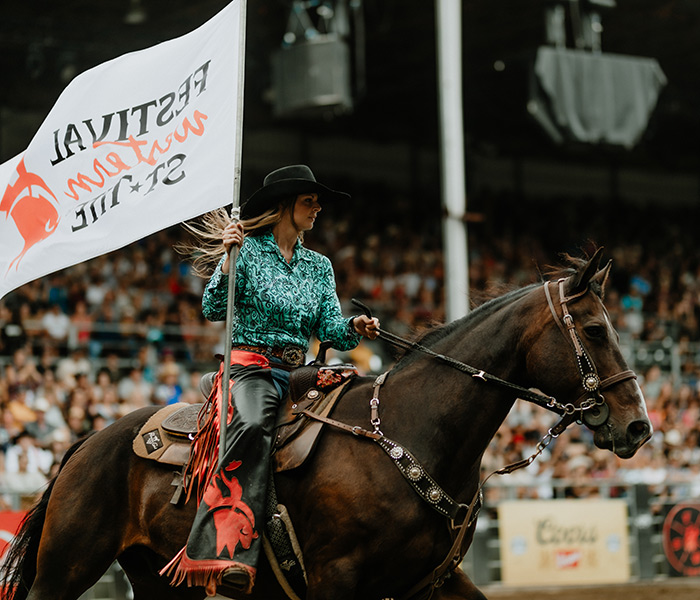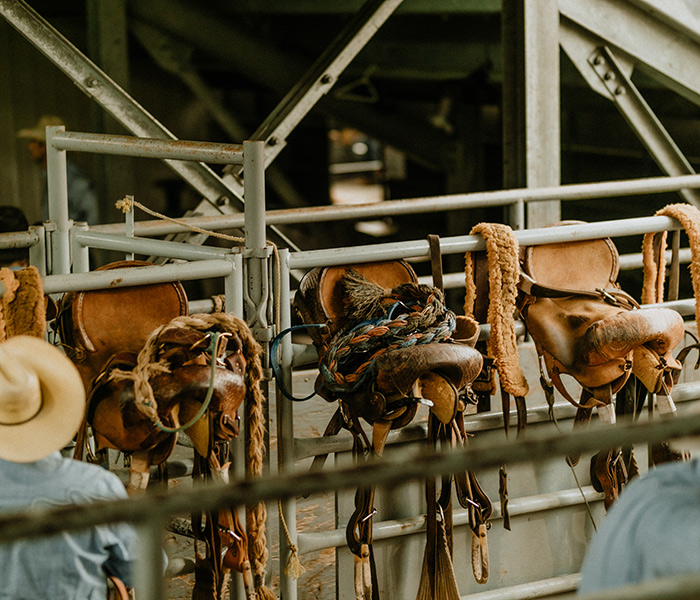ANIMAL WELFARE
At the Festival Western St-Tite, we want the animals to be in as peaceful and adequate environment possible, in order to limit stress levels and ensure their welfare. We keep bands of horses in the field for most of the time in order to maintain their natural environment. The bulls are lodged in large stalls outside the city in order to limit noise levels and interaction with visitors. They stay there for the duration of the Festival, except when they are transported to the main arena to perform. We also operate in strict adherence to federal animal keep and transport laws, be they Canadian or American. The Festival has built covered stalls behind the main arena building to keep horses and bulls out of direct sunlight or adverse weather before their performances.
The animal providers we hire are experts in their field and take their animals’ welfare to heart. They own and raise their herds of up to hundreds of heads and are proud of their animals’ physical state. They believe that just like human athletes, animals must be in perfect physical condition to perform as best they can during the rodeo events. This is why they nourish their herds the best hay and feed, which ensures that the animals develop in as balanced a fashion as possible.
When the animals turn three, the provider will test them for possible abilities in order for them to become rodeo horses or bulls. If the animals demonstrate the required abilities, they are returned to the field until the age of five so their bones and muscles can continue to develop. Subsequently, they return to perform on the rodeo circuit for the rest of their adult life. It should be noted that rodeo animals usually have fairly long intervals between their performances in order to maximize the time they have to recuperate and maintain their exceptional physical condition. Animals perform on average between 10 and 15 times per year.
In order to respect the time necessary to recuperate between performances, rodeo horses are allowed to participate a maximum of two times during the 10-day Festival, and the bulls are allowed three performances. The reason for the greater number of performances for bulls is that they have greater physical stamina. Each year, the Festival Western St-Tite welcomes around fifteen animal providers form all over North America. When providers require more than twelve hours to transport animals to St-Tite, they must stop on route to rest, feed and water their animals.

In an additional effort to protect the animals for the risks inherent to the sport and offer them the best environment possible, the Festival Organization has also made arena safety a priority. In order to do so, we have invested thousands of dollars to have an arena that is well adapted to for rodeo competitions. In fact, in the minds of our riders, we have acquired a very favorable international reputation by doing so. All rodeo employees work extremely hard before, during and after the Festival in order to maintain the arena surface in an ideal state.
VETERINARIANS
For its duration, the Festival hires a team of five veterinarians who are available around the clock to respond in case of an emergency, carry out the compulsory veterinary exams for animals performing in the rodeos and ensure a presence at the competitions in case injuries occur. The veterinarians we hire are experts in animal health and care and have all the competencies requires to conduct the compulsory vet exams as well as see to the welfare of all the animals on the Festival site.
They perform a veterinary exam we call Vet-Check (exclusive in North America) on all animals competing during the events. All competitors must bring their animals in for a general health examination. During the exam, vets will take the animal’s temperature, perform a cardiac and respiratory exam, check for abnormal secretions, check mucus membranes and verify lameness. Animal owners must present a Coggins test result, which is a compulsory test for equine infectious anaemia (EIA), transmitted through a virus. This test ensures that there will be no spread of EIA among the animals competing for the duration of the event.
To facilitate the vets’ work and ensure that the examinations take place in a secure environment, The Festival Western built a dedicated area, safe from inclement weather and on a level, stable ground surface. It is important that the horses be able to undergo the various tests for lameness on a steady surface adapted specifically for this type of test.
During the rodeos, veterinarians are present at all times before and during the event. At this time, their role consists of checking the state of all animals present in the training arena and ensuring that all animals have passed the compulsory pre-competition examination. During the rodeos, the vets diligently observe the animals’ overall state. If an emergency occurs or a problem arises, they are ready to intervene immediately. In fact, a vehicle containing all the emergency equipment necessary to treat any animal health issues promptly is available on site. After the competitions, the vets will perform random blood tests in order to analyse whether prohibited substances were administered to an animal. If the test shows as positive, any animal owner who claimed prize money for competing will be stripped of any awards and monies, as well as any other privileges e.g. gifts and others.
It is important to mention that the veterinarians have the necessary authority to disqualify an animal that does not meet the necessary requirements pre-established by the team of vets before the event. Accordingly, a rider who does not act properly with his/her mount will also be disqualified. These are true at all times during an event.

RODEO ASSOCIATIONS (SANCTIONS)
All rodeos are sanctioned by different associations. The Festival Western St-Tite is sanctioned by the International Professional Rodeo Association (IPRA). The IPRA is located in Oklahoma City, and it sanctions over 300 rodeos a year, counts over 3500 members and publishes a rule book which governs how rodeos work overall. In the same rule book, the IPRA devotes a section to the treatment of animals.
The IPRA have over 40 rules regarding animal welfare. The Festival also produces, through Wild Time Production Company, a dozen rodeos throughout Quebec and in New Brunswick in order to promote rodeo and allow competitors to qualify for St-Tite.
These rodeos are also sanctioned by the IPRA, as are a dozen others in the province of Quebec.
